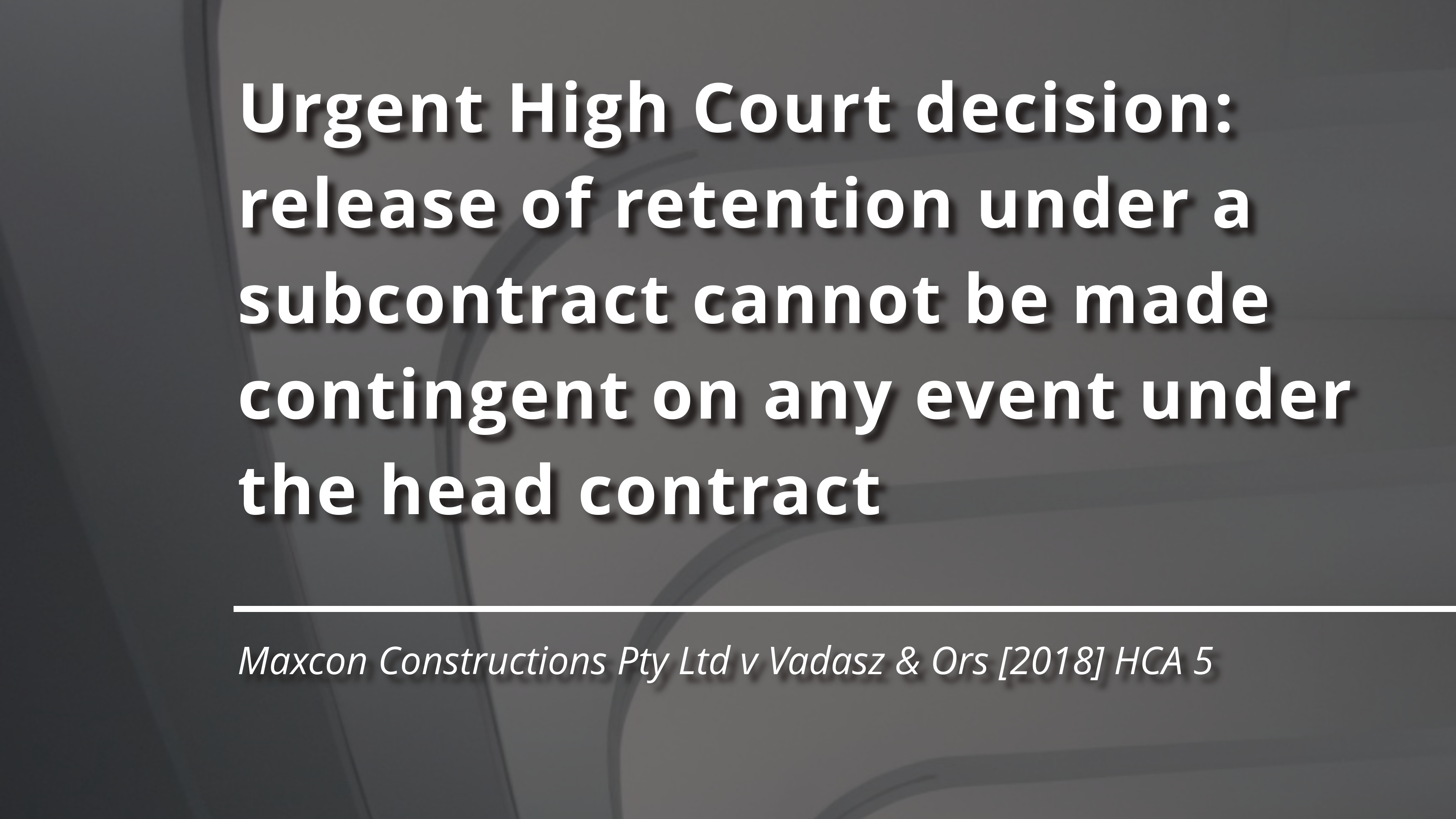
The High Court of Australia has today held that the release of retention under a subcontract cannot be tied to an event which is to occur under a head contract. The result is that contract provisions which seek to fix the release of retention to an event or obligation that does not relate to performance of the contract itself are likely to be held void, as ‘pay when paid’ provisions.
We have previously reported on the significant decision in Maxcon Constructions Pty Ltd v Vadasz (No 2) [2017] SASCFC 2, in which the Full Court of South Australia held that a requirement that a subcontractor’s retention could only be released once the head contractor had obtained a certificate of occupancy for the building was valid and did not breach the ‘pay when paid’ provisions under the Building and Construction Industry Security of Payment Act 2009 (SA) (the SA Act).
Earlier today, the High Court of Australia handed down its decision in Maxcon Constructions Pty Ltd v Vadasz & Ors [2018] HCA 5, unanimously overturning the ruling of the Full Court.
‘Pay when paid’ provisions
The High Court decision was in respect of section 12 of the SA Act which provides that a ‘pay when paid’ provision is void. A ‘pay when paid’ provision of a construction contract is a provision that makes the liability of a party to pay money contingent on itself being paid money by another party. Security of payment legislation in every Australian jurisdiction has equivalent or similar provisions to the same effect prohibiting ‘pay when paid’ provisions in construction contracts.
The relevant clause
In Maxcon, the relevant clause made the release of the subcontractor’s retention contingent upon the head contractor procuring a certificate of occupancy (equivalent of a certificate of classification).
The subcontract provided that retention shall be released as follows:
- 50 per cent to be released “90 days after CFO is achieved”;
- the remaining 50 per cent to be released “365 days after date of CFO”
Under the subcontract, “CFO” was defined to mean:
“the certificate of occupancy and any other Approval(s) required under Building Legislation which are required to enable the Works lawfully to be used for their respective purposes in accordance with [Maxcon’s] Project Requirements”.
The ruling of the High Court
The adjudicator decided that the relevant clause was void under s 12 of the SA Act as a ‘pay when paid’ provision.
The Full Court of South Australia disagreed, holding that the adjudicator had committed an error of law by reaching that conclusion. The Full Court held that payment of the retention amount was not contingent on payment under the head contract, but rather that obtaining the certificate of occupancy was an ‘independent event which was exogenous to both the subcontract and the head contract’.
The High Court agreed with the adjudicator’s conclusion that the clause governing the return of the retention was void as a ‘pay when paid’ provision.
The High Court held that the relevant clause was void because:
- the retention provisions made the due dates for payment contingent on the head contractor obtaining the certificate of occupancy; and
- the certificate of occupancy required satisfactory completion of the head contract before the dates for the release of the retention sum could be calculated.
Key takeaway
The High Court decision has broadened the scope of the ‘pay when paid’ prohibition in security of payment legislation. Whether a provision is void as a ‘pay when paid’ provision will need to be considered in the context of the broader contractual relationships between the parties on a project. In particular, a provision which makes the return of retention moneys to a subcontractor dependent on the head contractor’s performance of the head contract will likely be void as a ‘pay when paid’ provision.
This publication does not deal with every important topic or change in law and is not intended to be relied upon as a substitute for legal or other advice that may be relevant to the reader’s specific circumstances. If you have found this publication of interest and would like to know more or wish to obtain legal advice relevant to your circumstances please contact one of the named individuals listed.


